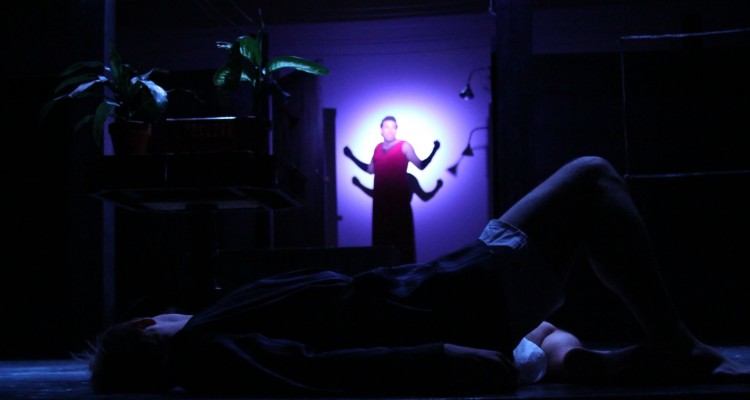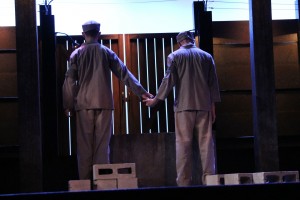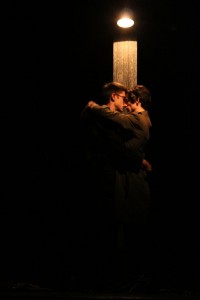Bent, Martin Sherman’s haunting 1979 play, looks at the persecution of gays in Nazi, Germany. The original London production starred Ian McKellan. This must have been risqué theater at the time, when most gays were still forced to remain closeted. It is a beautifully written, powerful piece of theater. Some of Sherman’s passages are so gut wrenching—it knocks the breath out of you.
Unfortunately, Hart House’s interpretation, directed by Carter West is far too light. The actors barely skim the surface of what is required to pull off this very difficult script. In Act One, we meet Max and Rudy, two gay lovers living in Berlin. They wake up after a late night out and banter back and forth while Rudy prepares breakfast. Right off the top, I did not believe the relationship. It was so disconnected and inauthentic, I knew that the much more taxing segments coming later on would be an enormous challenge for the cast to pull off. The scene perked up momentarily when a gorgeous, naked hunk of a man leapt out of bed, showing us every bit of him. This was the highlight of the night, and I assure you, with the material they were working with, it shouldn’t have been.
Bent is about life and death stakes. The stakes do not get greater than fighting for your very life and yet the actors continually fell short. There is a meeting in a park where Max’s gay uncle meets him to give him papers to get out of the country. Max does not want to leave his lover behind so he rejects the papers. A stranger sits at another bench and the two men worry that it might be a spy but the exchange between them is not tense or fearful which it would be if you thought you might be arrested at any moment.
In another scene, Max recounts being forced to fuck a dead thirteen-year-old girl to prove he is not gay. Where was the repulsion? I can’t even imagine how horrendous that would be. You would spend the rest of your life trying to get that awful image out of your mind yet the actor did not seem affected by this retelling. I guess it could be argued that he had become numb because that is the only way he could cope with this terrible event but I did not see the layers if that was the choice.
In Act Two, we are essentially left with Horst and Max at Dachau, moving heavy rocks back and forth for twelve hours a day, for what we assume has been months because they speak about the change in the season. Where was the weariness, the heaviness, the profound exhaustion, the fear and the hunger that would be with a person every waking moment in the circumstances there were in? The physicality of the actors remained the same as it did in the beginning of the play.
There is a gorgeous scene where the two men make love to each other, standing side by side, never touching or looking at each other but just describing what they were doing to one another. In another production of Bent, this scene was so heartbreaking that the entire audience was in tears as were the actors on stage. In this production, the audience was laughing at the end. Finally, Max and Horst are each faced with their own mortality and even that fell short. I didn’t feel the agony of that knowing, the anguish of realizing they were in the final moments of their lives.
Bent’s script is so powerful that in the right hands, it tears at your guts. It seemed that everyone involved with the show is very passionate about it, but they needed to go so much deeper, to the darkest places imaginable and it just didn’t happen.




I very much understand Bent and as mentioned in the review I saw a much more powerful version of the production previously where the actors not only brought in moments of light and joy but also showed the depths of despair, the struggle to stay alive and the weariness of being in a concentration camp for months or years. Emotionally, the actors in this production fell short. If you are in a concentration camp, it is most certainly about life and death stakes. I am not suggesting that they play every scene with that heaviness but that sense of urgency should have always been there, it should have been palpable and it wasn’t.
I feel so sorry that this reviewer doesn’t understand BENT. The making love scene she refers to was not written to be heartbreaking. Sex and love are not heartbreaking, they are joyful, thrilling things and this scene catches that beautifully.
I appreciated the moments of light and joy this production brings to the script, and thought both the direction and the actors brought new perspectives to material that can be seen as dated and depressing. Bent is most certainly NOT about life and death stakes….it’s about the indomitable strength of the human spirit.